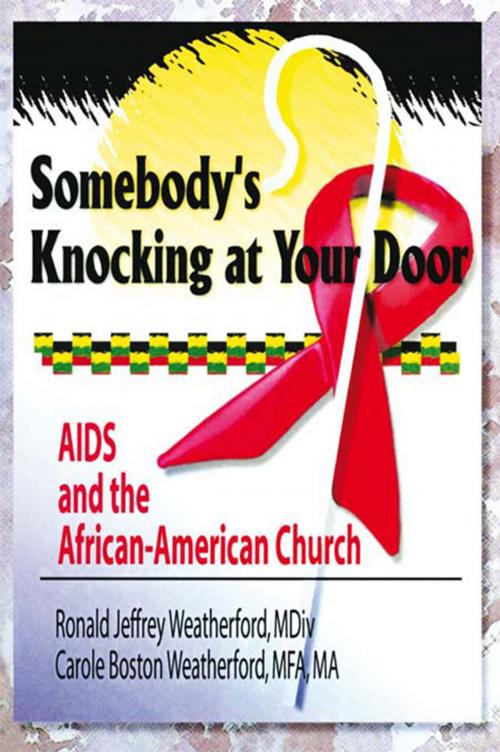Somebody's Knocking at Your Door
AIDS and the African-American Church
Nonfiction, Health & Well Being, Medical, Patient Care, Health Care Delivery, Allied Health Services| Author: | Harold G Koenig, Carole B Weatherford, Ronald J Weatherford | ISBN: | 9781135410414 |
| Publisher: | Taylor and Francis | Publication: | October 8, 2013 |
| Imprint: | Routledge | Language: | English |
| Author: | Harold G Koenig, Carole B Weatherford, Ronald J Weatherford |
| ISBN: | 9781135410414 |
| Publisher: | Taylor and Francis |
| Publication: | October 8, 2013 |
| Imprint: | Routledge |
| Language: | English |
Examining the black church’s response to AIDS, Somebody’s Knocking at Your Door: AIDS and the African-American Church analyzes sexual ethics and homophobia in the black church to provide pastors, social workers, and health professionals with intervention strategies for parishioners or members of the community who have AIDS. By discussing the church’s historic and successful activism and its relationship to the community, along with AIDS statistics, relevant theologies, and other AIDS ministries, this book suggests the benefits of increased church involvement versus other agencies or organizations. Somebody’s Knocking at Your Door will help you develop prevention education and pastoral care programs that will alert individuals to the risks of AIDS and will offer people with AIDS the comfort and assistance they need in coping with the disease.
Through the voices of leading clergy, AIDS advocates, and people living with AIDS (PLWAs), this book calls on the African-American church to become more involved in helping communities deal with the disease. Somebody’s Knocking at Your Door offers you ideas on how to improve the lives of individuals with AIDS through the church, including:
-
welcoming PLWAs into the church through announcements by local media, church newsletters, and Sunday bulletins
-
offering AIDS support groups at the church or loaning office space, equipment, or clerical assistance to AIDS organizations
-
recognizing the power of intercessory prayer for PLWAs
-
caring for PLWAs by delivering meals to their homes, preparing meals at the church, and developing a transportation network that will take parishioners to doctor appointments, church, or on recreational outings
-
preparing meals, running errands, housekeeping, handling paperwork, negotiating legal issues, and offering friendship-- possible components of volunteer “buddy programs” for homebound PLWAs
-
training pastors, clergy, and Sunday school teachers to educate ministries on AIDS in the African- American community, sexual intimacy, intravenous drug use and needle sharing, monogamy, community resources, and condom use
Since some clergy still believe that AIDS is a “gay” disease, Somebody’s Knocking at Your Door discusses the issue of homosexuality within the church. By analyzing passages from the Bible, the authors refute the belief that homosexuals were neglected by God and undeserving of care and love. This belief, according to the authors, inhibits some churches and individuals from discussing HIV/AIDS because of fear they would also be acknowledging homosexuality. Highlighting AIDS ministries throughout the United States, Somebody’s Knocking at Your Door encourages the African-American church to confront the issue of AIDS and understand that the disease can affect anyone. This book will give you the necessary strategies for starting and implementing AIDS ministries and intervention programs that will educate and support your community.
Examining the black church’s response to AIDS, Somebody’s Knocking at Your Door: AIDS and the African-American Church analyzes sexual ethics and homophobia in the black church to provide pastors, social workers, and health professionals with intervention strategies for parishioners or members of the community who have AIDS. By discussing the church’s historic and successful activism and its relationship to the community, along with AIDS statistics, relevant theologies, and other AIDS ministries, this book suggests the benefits of increased church involvement versus other agencies or organizations. Somebody’s Knocking at Your Door will help you develop prevention education and pastoral care programs that will alert individuals to the risks of AIDS and will offer people with AIDS the comfort and assistance they need in coping with the disease.
Through the voices of leading clergy, AIDS advocates, and people living with AIDS (PLWAs), this book calls on the African-American church to become more involved in helping communities deal with the disease. Somebody’s Knocking at Your Door offers you ideas on how to improve the lives of individuals with AIDS through the church, including:
-
welcoming PLWAs into the church through announcements by local media, church newsletters, and Sunday bulletins
-
offering AIDS support groups at the church or loaning office space, equipment, or clerical assistance to AIDS organizations
-
recognizing the power of intercessory prayer for PLWAs
-
caring for PLWAs by delivering meals to their homes, preparing meals at the church, and developing a transportation network that will take parishioners to doctor appointments, church, or on recreational outings
-
preparing meals, running errands, housekeeping, handling paperwork, negotiating legal issues, and offering friendship-- possible components of volunteer “buddy programs” for homebound PLWAs
-
training pastors, clergy, and Sunday school teachers to educate ministries on AIDS in the African- American community, sexual intimacy, intravenous drug use and needle sharing, monogamy, community resources, and condom use
Since some clergy still believe that AIDS is a “gay” disease, Somebody’s Knocking at Your Door discusses the issue of homosexuality within the church. By analyzing passages from the Bible, the authors refute the belief that homosexuals were neglected by God and undeserving of care and love. This belief, according to the authors, inhibits some churches and individuals from discussing HIV/AIDS because of fear they would also be acknowledging homosexuality. Highlighting AIDS ministries throughout the United States, Somebody’s Knocking at Your Door encourages the African-American church to confront the issue of AIDS and understand that the disease can affect anyone. This book will give you the necessary strategies for starting and implementing AIDS ministries and intervention programs that will educate and support your community.















